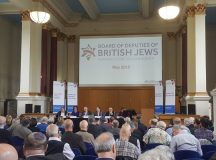In July 2018, an opinion piece in the Jewish Chronicle identified ‘fundamental questions which must now be urgently asked’ in light of what it termed the ‘potentially seismic change’ indicated by recent developments within the Anglo-Jewish community and its relationship to Israel. The Fathom editors believe there is a place for the journal to provide a platform to some of the voices in this debate to express their views. In this context, Fathom invited Mick Davis, Rabbi Laura Janner-Klausner, Dr Keith Kahn-Harris, Dr Toby Greene, Robin Moss, Simon Gordon, Tamara Berens, Jonathan Hunter, Hannah Weisfeld and Maya Ilany to share their opinions. Download the full symposium here.
Fathom Jounal: The Jewish Chronicle (JC) posed the question ‘what exactly is the centre ground for British Jews on Israel now?’ How would you answer that question?
Hannah Weisfeld and Maya Ilany: For the overwhelming body of British Jews, the ‘centre-ground’ is a deep commitment to Israel and its centrality to Jewish identity. Beyond that, concern for Israel’s safety and security, support for the two-state solution, pride in its democratic foundations and liberal traditions, and an opposition to the settlement project in the occupied Palestinian territories forms the basis of opinions on Israel.
In 2015 Yachad funded a piece of research into British Jewish attitudes to Israel. Carried out by a group of academics under the auspices of City University, with field work conducted by Ipsos Mori, it is the most detailed and up-to-date analysis that exists of the British Jewish community’s attitudes towards Israel. The research shows our community is supportive of Israel, while the attitudes towards specific government policies are far more diverse. The vast majority of British Jews support Israel’s right to exist as a Jewish state (90 per cent). There is a small minority in our community who believes that Palestinians do not have a right to a land of their own (14 per cent), or that settlements are not an obstacle to peace (14 per cent), but these are marginal views. The majority of British Jews (75 per cent) believe the expansion of settlements are an obstacle to peace.
While the data demonstrates where the majority of the community stands on Israel, some of our communal organisations may give the impression that when it comes to the Jewish homeland, the community holds more hawkish, right-wing views. This is because these views, which are held by a smaller minority, have traditionally dominated the agenda of some communal institutions. This may provide some explanation as to why the research revealed that those with more hawkish attitudes overestimated the prevalence of their own views two-fold, whilst those with more dovish views about Israel underestimated the prevalence of their own views by 10 per cent.
FJ: What responsibilities do British Jews have – if any – to not give a tail wind to those who would demonise Israel, and how should they avoid doing so in practice?
HW & MI: First of all, British Jews do not have an obligation to defend Israel by default. As the IHRA working definition of antisemitism makes clear: Jews are not collectively responsible for the actions of the Israeli government and therefore they do not have a responsibility to defend policy decisions of the Israeli government.
There is often a misconception that in order to ‘win’ friends for Israel, it is important to present Israel solely in a positive light when speaking to non-Jewish audiences, regardless of what our own opinions are. Yet, not only does that allow those that are not friends of Israel to define our relationship as Jews to Israel, it also presents Israel, and supporters of Israel, being entirely monolithic in their opinions.
In Yachad’s case, as a Zionist, pro-Israel organisation, we have made it our mission to stand up for the Israel we believe in regardless of whether it is a Jewish or non-Jewish audience we are engaging with. At times that might mean defending Israel and Zionism, and in other circumstances being critical of policies of the Israeli government – past and present.
In our experience, the best way to beat those who wish to demonise Israel is not by ignoring the issues they present – it is by winning the argument. And we win the argument by showing that Liberalism and Zionism are perfectly compatible. We are able to demonstrate that being pro-Israel does not mean supporting the occupation of the Palestinian territories or the Nation-State Law, and that current policies of the Israeli government are not the definition of Zionism.
It is because we are willing to criticise the occupation and anti-liberal trends in Israel, as opposed to ignoring them, that we are able to win the argument in favour of Israel.
FJ: What kinds and forms of criticism of / engagement by British Jews with Israel and Israeli policy and practice do you consider acceptable / most effective, and which are unacceptable / least effective?
HW & MI: It is important to note that there is a significant difference in being acceptable and effective. In a society governed by laws of free speech, whilst we may fundamentally disagree with the way in which others express their support for or frustrations with Israel, unless there is incitement or racial hatred at the heart of what is being said or done, it is not ‘unacceptable,’ even if we are offended. There is a part of the community, for example, that resorts on a relatively frequent basis to calling those with whom they disagree ‘Kapos’. This choice of language would fall into the category of unacceptable. Were this a non-Jew directing this language towards a Jew, this would be deemed to be antisemitic and demeaning of the memory of the holocaust. The same should apply to the way in which Jews talk to other Jews when it comes to discussions about Israel.
When it comes to the question of effectiveness, this is a judgement call as to whether your choice of ‘action’ or ‘language’ is likely to have the desired impact. Whilst actions or use of language that offends large numbers of people might not be ‘unacceptable,’ they are most likely to be ineffective as significant numbers of people will be deterred from engaging with the point you are trying to make. Likewise, displaying a lack of empathy towards others’ concerns is unlikely to be effective.
FJ: To what extent do you agree with the assertion that there is a ‘potentially seismic change’ in the way that British Jewry discusses and feels about Israel?
HW & MI: The narrative of the community, has for some time, been framed around the idea of ‘being in the tent’ when it comes to Israel i.e. that there are a set of opinions that are considered to be acceptable, if not vastly different, that are all within communal red lines on discourse on Israel. Those that hold views beyond those red lines are ‘out the tent’. These lines broadly are, on the Left of the community, support for BDS i.e. those that support the BDS movement are not in the tent, and on the Right, support for a two-state solution i.e. those that support a single state where non-Jews are second class citizens are out of the tent. Yet these lines, which have been somewhat arbitrarily defined, are becoming harder to maintain.
Previously, it was assumed that those that engaged in the more ‘critical’ end of anti-occupation activism were outside the mainstream of the community. However, if the events of the past six or so months are anything to go by, quite the opposite is true. Those that are most engaged, most knowledgeable and most switched on, are frustrated by what they see taking place in Israel and are looking for ways to express their concerns and frustrations. It is no longer possible to dismiss those engaging in this type of activism as being disengaged Jews. Likewise, when high profile members of the Israeli government express views that do not support a two-state solution, and are at times deeply racist, it is becoming harder to suggest that anti-occupation activists are out of the ‘tent’ or beyond the red line. Consequently, it seems that the element of ‘control’ that once existed over community discourse on Israel, is simply no longer present in the debate. It is only a matter of time before this will result in a ‘seismic change’.









































